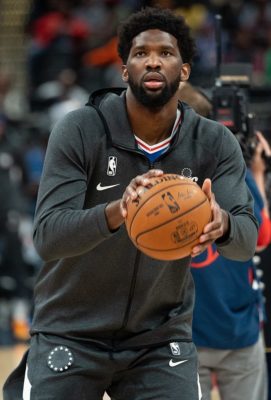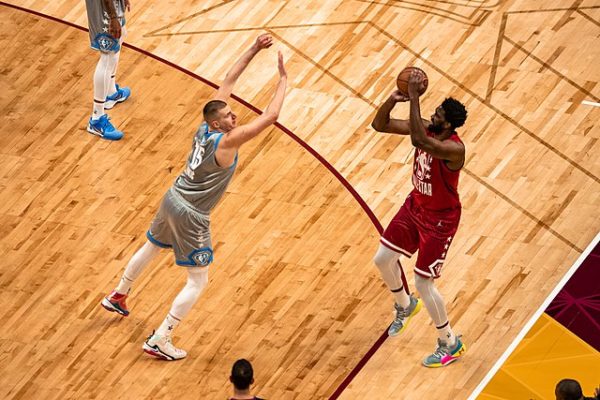Oh Mr. Embiid. Here we are again. For the fifth straight time, Joel Embiid and the Philadelphia 76ers have failed to make the Eastern Conference Finals. In these five years, the 76ers have attempted every conceivable roster construction around their superstar big man. Nevertheless, an inability to succeed in the spring and summer is apparent. However, almost all blame for these shortcomings seems to be directed towards teammates, injuries, or coaching and never at the sole consistent factor of these teams: Joel Embiid.
To illustrate how different each year’s roster has been for the Sixers, I will discuss their roster and how that team functioned at the time of that year’s playoffs. The obvious place to start is the 2017-2018 season. Outside of Embiid and Simmons, the core group of that team consisted of Tj McConnel, Dario Saric, JJ Reddick, Marco Belinelli, Robert Covington, Irsan Ilyasova, and Amir Johnson. In other words, the Sixers had myriad high-level shooters around two below average to non-shooters. Of course, there are some exceptions to this rule such as Amir Johnson, but even he was strategically played as Embiid sat to not run into spacing issues. This is not an odd way to build an NBA team as the Lebron lead Cavaliers, Harden Rockets, and modern Luka lead Mavericks have built some of the best offenses of all time with this formula. Of course, the offensive black hole that is Ben Simmons was on those teams, but the surrounding pieces were more than put into place for Embiid to succeed in the playoffs.
The Sixers drew the Miami Heat in the first round and made quick work of a team whose offense was led by a 36-year-old Dwayne Wade. The next round was far more interesting as they drew a much more complete basketball team, the Boston Celtics. This was Jayson Tatum and Jaylen Brown’s respective rookie and sophomore season, so the reigns of the offense were not yet put in their hands. Instead, the Celtics were led by Kyrie Irving that regular season, but he was sadly injured and could not compete in that year’s playoffs. Of course, Gordon Hayward was nowhere to be seen as he had broken his leg at the beginning of the season. So, instead of relying on proven stars to generate offense, the Celtics were instead led by a group effort of pretty good offensive players. In short, the Sixers should have won this series as they had by far the best offensive player in Joel Embiid. However, they didn’t. They were not only beaten but embarrassed by a team that had no business doing so.
Like most young teams who have their first taste of playoff success, the Sixer’s roster-building desires changed to bigger fish. They failed to find a move that suited their interest in the Summer, but early into the 2018-2019 season, they found their guy: Jimmy Butler. The Sixers traded Robert Covington, Dario Saric, Jared Bayless, and a second-round pick for Butler basically stealing him from Minnesota. The sixers were not done with mid-season acquisitions as they also traded for fringe all-star caliber player, Tobias Harris. As they moved into the springtime, the Sixers starting lineup consisted of Ben Simmons, JJ Reddick, Jimmy Butler, Tobias Harris, and Joel Embiid. Of the bench, James Ennis, Boban Marjanovic, Furkan Korkmaz, Greg Monroe, Mike Scott, Johnathan Simmons, Amir Johnson, TJ McConnel, and Jonah Bolden, made up one of the admittedly worst benches I have ever seen. Regardless, the sixers had sacrificed spacing and depth to assemble a drastically different basketball team led by star power.
The 2018-2019 season saw the Sixers play the best basketball they have with Embiid. They embarrassed the pre–Kevin Durant Nets, beating them in five games. In the next series, they played the eventual NBA champion Toronto Raptors. Anyone who watched this series remembers it as an instant classic in which two remarkably closely skilled teams dueled to the end. Embiid and the Sixers did lose this series, but one cannot attack either of them for that loss. If Embiid’s playoff losses would have stopped after that series, there would be no reason for this argument or article. However, they did not stop.


After a season where it seemed the sixers were genuinely competing for a championship, the Sixers shocked the basketball world by letting Jimmy Butler walk in a sign and trade with the Miami Heat. In this trade, they received Josh Richardson. Then they shocked the world again when they gave Al Horford huge money to create a set of twin towers with Joel Embiid. Although these roster moves did not amount to many games won, the Sixers again completely shifted the style of their roster to a long, tall, defensive unit. The starting unit for this team was Ben Simmons, Josh Richardson, Tobias Harris, Al Horford, and Joel Embiid. Shake Milton, Matisse Thybulle, Mike Scott, and Furkan Korkmaz also played considerable minutes.
This was the most disappointing year for the Sixers since their initial playoff season. In a shortened season they only managed to finish 6th in the eastern conference and were then again embarrassed by the Boston Celtics in a 4-game sweep. Ben Simmons was injured during that series, which most likely cost the Sixers a game, but even without him, the roster around Embiid was a fantastic defensive unit and most likely a better offensive unit due to Simmons’ absence.
The next offseason, the sixers again decided drastic roster moves would be in their best interest. They deemed the offense lost by playing Horford was more important than the immense defense added and traded him to Oklahoma City for Danny Green and a few players of little importance. They also shipped the defensively oriented Josh Richardson to the Mavericks for the shooting of Seth Curry. They signed George Hill and Dwight Howard to deals to come off their bench. Lastly, they drafted a steal at the 21st pick; Tyrese Maxey. This new group was faster, more skilled, and better at shooting. The starters for this group consisted of Ben Simmons, Danny Green, Seth Curry, Tobias Harris, and Joel Embiid. Again, we can see the Sixer’s front office build with the idea of surrounding Embiid and Simmons with high-quality role players similar to the 2017-2018 season.
This newly built group was far more effective as they managed to secure the number one seed in the east and made quick work of the Wizards in the first round of the playoffs. The sixers then drew the Atlanta Hawks in the conference semifinals. This Hawks vs. Sixers series was eerily like the 7-game series against Toronto two years before as it was nearly impossible to separate these two teams from each other. But, why? This was the Hawks first time making the playoffs with Trae Young and because of how early they were in their rebuild, they did not have as complete of a roster as the Sixers. The team was talented, but they drastically lacked defense when Clint Capela was on the court. They were also relying on Bogdan Bogdanovic and Danilo Gallinari to generate offense in non-Trae Young minutes. Those guys are good players, but not the guys one would imagine can beat Embiid surrounded by quality role players and shooters.
After the season, Ben Simmons decided he wanted nothing to do with the Sixers and sat out until the team traded him. This trade of course revolved around Simmons and Harden switching teams, but Seth Curry and Andre Drummond were also moved to Brooklyn. The Sixer’s management decided the heliocentric role player-dominated roster was not going to get the Sixer’s where they wanted, and they instead pivoted to a star-dominated team. By combining the playmaking of Harden and the rolling gravity of Joel Embiid, the Sixer’s front office created their 5th distinctly different team in 5 years.
The Sixer’s main contributors, once all roster moves were complete, were James Harden, Tyrese Maxey, Danny Green, Tobias Harris, and Joel Embiid with Shake Milton, Matisse Thybulle, Furkan Korkmaz, Georges Niang, and Paul Reed off the bench. This team combined star ability with speed, defense, and shooting on the wings and off the bench. The sixers were taken to 6 games by a young and surprisingly competent Raptors team. The Sixers should have won in fewer games, but regardless they moved on to the next round to face the Miami Heat. Directly before that game, tragedy struck as Joel Embiid was sidelined for the first two games of the series with a right orbital fracture. In those two games, the Sixers were usurpingly embarrassed creating a 2-0 hole for embiid to attempt to climb out of. However, the Sixers were unable to do this and lost in 6 games. I wouldn’t be able to find offense to this series loss based on the before-mentioned disadvantage, but considering the last four seasons, this is yet one more example of Joel Embiid not being able to conjure THAT series.
Joel Embiid has made the playoffs for 5 straight seasons without once making it even to the conference finals. During these 5 years, roster decisions have been made by different people, coaches have been fired, and 5 completely different rosters have been assembled around Embiid. For context, since that 2017-2018 playoff runs the only player still on the Sixers is Embiid himself. Why has Embiid not received any backlash for his team’s shortcomings? First, the blame went to age, and then a once-in-a-lifetime shot, then roster construction, then Ben Simmons, and finally to Doc Rivers and James Harden. These are all valid reasons to lose playoff series, but eventually, a top 10 NBA player needs to assert himself and take his game to a point where his team will undeniably win. For some reason, Embiid has not been capable of this. So, Mr. Embiid the ball is in your court. Shut me up and get to a finals. I worry this may be unachievable for some reason, but the day it does will cement Joel Embiid as an undisputed top 5 player in the NBA and cement his place as one of the best big men to ever play the game.




